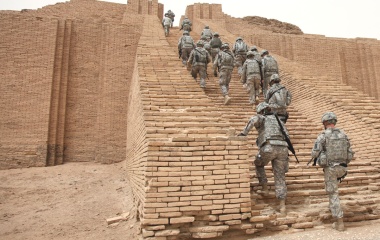
"And Lemech called him Noach saying, this one will bring us relief, yenachmeinu, from our work and the anguish of our hands, from the soil that G-d had cursed" (Breisheet 5:29 ). After ten generations of despair there was hope that Noach would bring relief, nechama, to a cursed world. Due to the sin of Adam HaRishon, "the ground will be cursed because of you. You will derive food from it with anguish all the days of your life". Noach is the first person whose birth is recorded in the Bible following the death of Adam. For the first time there would be no link to Adam and Gan Eden and the days of his life. Hope reigned supreme for a fresh beginning.
Alas, Lemech's hope for his son would not be met. While Noach was a righteous man he was unable to bring relief to the world. The rot was so deep and pervasive that no man, no matter how great, could change it. It was during the lifetime of Noach that all, save his immediate family were destroyed. After an entire year in the ark even nature needed a full cycle to recover. Noach and his family emerge and begin to repopulate the world. The Torah records 70 descendants of Noach, those who were destined to become heads of state. Despite the population growth and the passage of hundreds of years "the entire earth had one language with uniform words" (Breisheet 11:1). The New World was one in which people worked together building cities and showing great signs of technological achievement. Yet G-d decided to "descend and confuse their speech, so that one person will not understand another's speech" (11:7). The reasons for the dispersion are left unexplained in the Biblical text. In fact their actions - building cities, towers and skyscrapers seem quite admirable.
While their actions were noble their intentions were not. "Let us make ourselves a name, so that we will not be scattered all over the face of the earth" (Breisheet 11:4). Technology, progress, political structures, coalitions are all wonderful if they are done to advance the name of G-d, to elevate the moral behavior of man. But if done "to make ourselves a name" then we are to be scattered over the face of the earth.
Man was created to call out and make known G-d's name. "I will proclaim the name of G-d and praise Him for his greatness" (Devarim 32:3). These words contained in the last speech of Moshe Rabbeinu indicate the duty of the Jewish people to publicize the greatness of G-d. Perhaps the reason that it is Abraham and not Noach who is regarded as the first Jew is because it was Abraham who first explicitly called out in G-d's name. Reacting to G-d's promise that his descendants would inherit the land he built an altar and called in G-d's name(Breisheet 12:8). Note the connection between the land of Israel and the G-d of Israel. Demonstrating the beautiful way of life G-d has given us is only truly possible as a nation dwelling in the place "that G-d has chosen to establish His name" (Devarim 12:5).
Abraham is descended from Noach's son Shem that means name. What a strange name for a son: he named him Name! Yet it was to be his sons who would acknowledge the ultimate Name.
It is natural to want to make a name for ourselves. As descendants of those who called out in the name of G-d we must recognize that it is G-d's name that must be supreme. We must use the "names" we have acquired for bringing honour to the name of G-d. If we succeed in doing so then we can be confident that the blessing given by G-d to Abraham will be fulfilled in us: May the blessing of "I will make great your name" (Breisheet 12:3) soon be realized. Shabbat Shalom!



